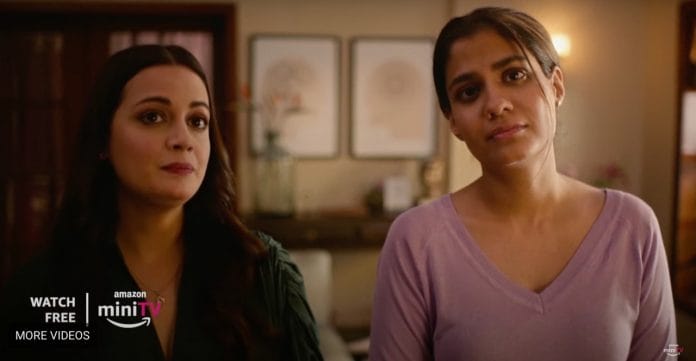Gray’, starring Dia Mirza and Shreya Dhanwanthary, could be the perfect short movie exploring the idea of consent at a time when India debates the law on marital rape. The 30-minute film, which released Friday on Amazon miniTV, comes shortly after the Delhi High Court delivered a split verdict in a case that sought criminalisation of marital rape, falls short of adding anything new on the debate surrounding consent, and fails to deliver a strong message.
The movie explores the trauma that Naina (Shreya Dhanwanthary), a young woman living in Mumbai, goes through after she’s forcefully kissed by her best friend of six years. But was the night consensual or was Naina violated? The story finds an answer to this question in the therapy sessions between Naina and Dr Noorani (Dia Mirza).
The movie at best is lukewarm. It’s unnecessary to produce a lacklustre script at a time when India is going through the biggest debate on consent at the highest levels of the judiciary.
Also read: Modern Love: Mumbai is all about ‘ishq, mohabbat, pyaar’. But it’s not that ‘modern’
What’s new?
The movie, made with the best of intentions, rushes through the plot, failing to give its characters or ideas any justice. Perhaps if it had been picked as a limited series or even as an hour-long movie, intricacies of characters’ relationship with each other could have been explored, providing depth to the script. A 30-minute window for exploring such a heavy topic seems to have coerced the writer and director Sakshi Gurnani into putting their story on the fourth gear prematurely.
Such scripts come out best when explored at a comfortable, laid back pace, because a slower, longer film would reflect the process of getting over trauma. Take the example of Big Little Lies, an HBO limited series. It explores the lives of women in a small town in the US, by the sea. Both the ocean and the city’s pace are perfectly woven into the script as well. Watching the show, you feel like you’re a part of that town. If a viewer doesn’t experience the protagonists’ story at the same pace as them, then they’re never able to identify with them.
Drawing power from simplicity defines the short film format. You say things without saying them. You show them. Isn’t that the power of movies? Gurnani completely misses the mark.
This problem is embodied in a poem Naina reads to the therapist at the end of the movie. The poem is lazily written. It’s an injustice to the character who is introduced as a star advertising copywriter. You’d expect a copywriter, at least, to understand that a poem needs to say things without saying them. That if you just say everything, there’s no beauty in the poem. Stating everything as is, is reducing poetry to a lyrical prose.
The poem could’ve been a good way to end the movie as it encapsulates the feelings of the protagonist, and her journey of overcoming the trauma, but at the same time it is also a lazy conclusion to a lazy story. So I guess a perfect fit.
(Edited by Prashant)






